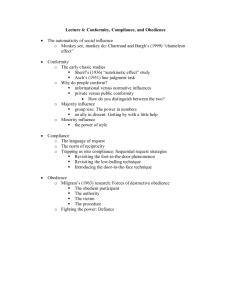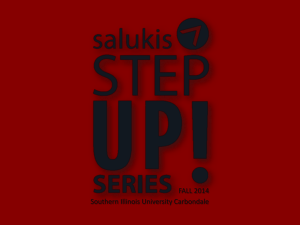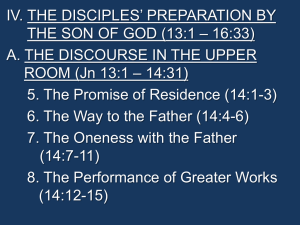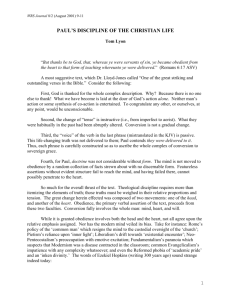Love seeks to depend joyfully - Istituto Figlie di Maria Ausiliatrice
advertisement
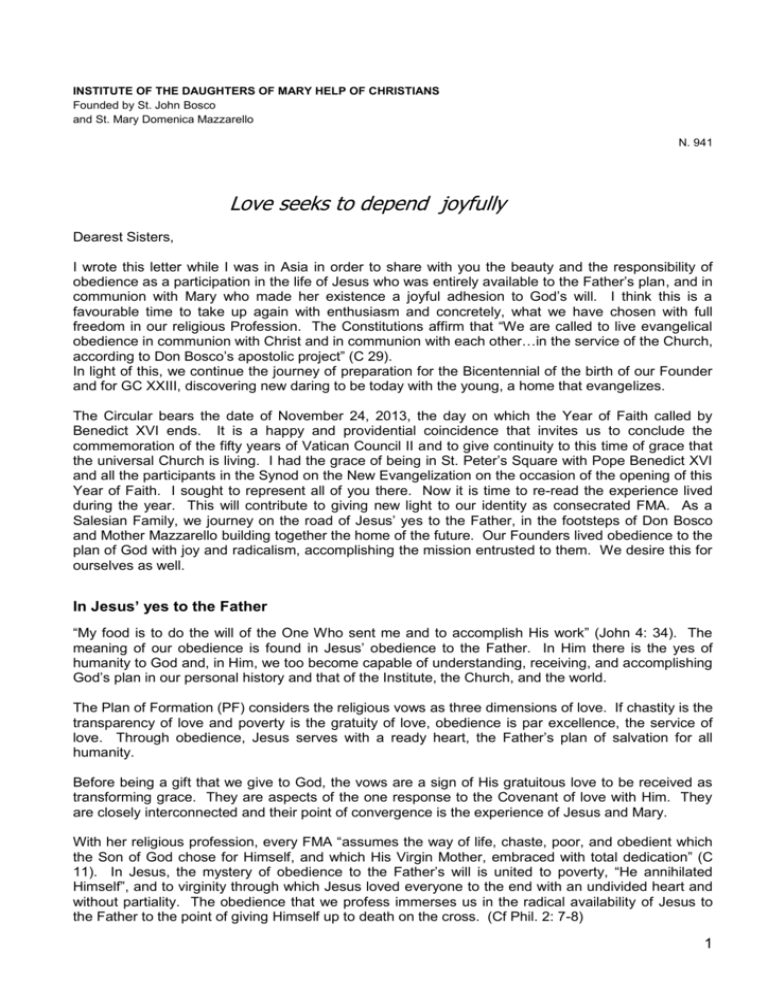
INSTITUTE OF THE DAUGHTERS OF MARY HELP OF CHRISTIANS Founded by St. John Bosco and St. Mary Domenica Mazzarello N. 941 Love seeks to depend joyfully Dearest Sisters, I wrote this letter while I was in Asia in order to share with you the beauty and the responsibility of obedience as a participation in the life of Jesus who was entirely available to the Father’s plan, and in communion with Mary who made her existence a joyful adhesion to God’s will. I think this is a favourable time to take up again with enthusiasm and concretely, what we have chosen with full freedom in our religious Profession. The Constitutions affirm that “We are called to live evangelical obedience in communion with Christ and in communion with each other…in the service of the Church, according to Don Bosco’s apostolic project” (C 29). In light of this, we continue the journey of preparation for the Bicentennial of the birth of our Founder and for GC XXIII, discovering new daring to be today with the young, a home that evangelizes. The Circular bears the date of November 24, 2013, the day on which the Year of Faith called by Benedict XVI ends. It is a happy and providential coincidence that invites us to conclude the commemoration of the fifty years of Vatican Council II and to give continuity to this time of grace that the universal Church is living. I had the grace of being in St. Peter’s Square with Pope Benedict XVI and all the participants in the Synod on the New Evangelization on the occasion of the opening of this Year of Faith. I sought to represent all of you there. Now it is time to re-read the experience lived during the year. This will contribute to giving new light to our identity as consecrated FMA. As a Salesian Family, we journey on the road of Jesus’ yes to the Father, in the footsteps of Don Bosco and Mother Mazzarello building together the home of the future. Our Founders lived obedience to the plan of God with joy and radicalism, accomplishing the mission entrusted to them. We desire this for ourselves as well. In Jesus’ yes to the Father “My food is to do the will of the One Who sent me and to accomplish His work” (John 4: 34). The meaning of our obedience is found in Jesus’ obedience to the Father. In Him there is the yes of humanity to God and, in Him, we too become capable of understanding, receiving, and accomplishing God’s plan in our personal history and that of the Institute, the Church, and the world. The Plan of Formation (PF) considers the religious vows as three dimensions of love. If chastity is the transparency of love and poverty is the gratuity of love, obedience is par excellence, the service of love. Through obedience, Jesus serves with a ready heart, the Father’s plan of salvation for all humanity. Before being a gift that we give to God, the vows are a sign of His gratuitous love to be received as transforming grace. They are aspects of the one response to the Covenant of love with Him. They are closely interconnected and their point of convergence is the experience of Jesus and Mary. With her religious profession, every FMA “assumes the way of life, chaste, poor, and obedient which the Son of God chose for Himself, and which His Virgin Mother, embraced with total dedication” (C 11). In Jesus, the mystery of obedience to the Father’s will is united to poverty, “He annihilated Himself”, and to virginity through which Jesus loved everyone to the end with an undivided heart and without partiality. The obedience that we profess immerses us in the radical availability of Jesus to the Father to the point of giving Himself up to death on the cross. (Cf Phil. 2: 7-8) 1 We take a quote from Consecrated Life: the Plan of Formation, which affirms that Jesus “reveals the mystery of human freedom as a journey of obedience to the Father’s will and the mystery of obedience as a journey of progressive conquest of true liberty” (PF, pp. 22-23). To make our own Jesus’ prayer, “Your will be done”, demands a concrete itinerary of asceticism and of conversion to purify the heart of all that impedes our being free and open to embrace God’s plan. Through obedience, Jesus gives the great gift of educating us to “put ourselves entirely in God’s hands” (C 80), whose ways are not our ways. He is the God of surprises. With His wise pedagogy, He opens horizons which, though different from our own, are always expressions for the good, for salvation, for full realization. Obedience introduces us into the mystery of the Covenant with God who has chosen us with foreseeing love. At the same time, to live obedience in this way is to discover the mystery of the covenant among us, as a community rooted in the Trinitarian communion, called to a common mission. (Cf C 29). Living evangelical obedience is to rediscover the first love, the inspiring spark from which the following of Christ began. To God belongs the primacy of love. The sequela is the response of love to His love. If ‘we love’ it is ‘because He has first loved us” (1 John 4: 10/19). This means recognizing this love with the intimate awareness that made the apostle Paul say, “Christ loved me and gave His life for me” (Galatians 2: 20). He gave it in obedience to the Father’s will (Cf Ripartire da Cristo, n. 22). I invite you to discover this precious source of the religious vows, and in particular, of obedience that radiates from the fascinating face of Christ contemplated, loved, followed. When our life is superficial, sad, melancholy, unhappy, could it be because we have lost the attraction of Christ. We are no longer able to discover His face in mediations and we wait on a dead end road without hope? GC XXII indicated among the journeys of conversion to love, the memory of the living Jesus, of His way of being and of acting. Through obedience, we conform ourselves to Christ to accomplish the service of love that our vocation requires. The yes of Mary that consented to the Incarnation of God’s Son, helps us to live obedience in faith. Her whole life was a pilgrimage of faith (Cf Lumen Fidei, no. 58) the same way that each of ours is called to be. She is the Teacher, Companion, and Guide on our journey toward Jesus, of whom she is Mother and Disciple. She is the Helper who precedes us on the journey and gives us security. In the Footsteps of our Founders In visiting the communities and in encounters with numerous Sisters, I can affirm with joy and gratitude that the Institute is committing itself in a responsible way to know, study, and live the Constitutions, held to be the concrete expression of the Gospel for every FMA. There is in many the awareness that our Plan of life, rooted in the Word of God, is the securest reference to verify personal and community life and the apostolic mission. Many draw upon these sources for courage and availability to restore renewed splendour and credibility to the charism in the Church and in society. Our Founders teach us with their witness the value of obedience lived as a response of love to God woven with deep faith, in the awareness that without faith, obedience is impossible. When he spoke to the FMA, Don Bosco frequently referred to obedience. He held it to be the fulfilment of all virtues, the secret to happiness, and the source of the missionary vitality of the Institute. In effect, it is “the axis upon which our life turns, because it is closely linked to our apostolic mission and has a marked community dimension” (C 32 and Cf MB VI 933). On the occasion of the Spiritual Retreat at Turin in 1878, Don Bosco gave a reflection to the FMA that is actual even today, “Do we want to be happy always? Let us be obedient! Do we want to be certain of persevering in our vocation? Let us be obedient always! Do we want to rise very high in holiness and in Paradise? Let us be faithful in obeying even in small things” (MB XIII 210). 2 At Mornese, Don Bosco’s directives on obedience found a favourable terrain. Mother Mazzarello knew not only how to live obedience in faith herself; she animated the first Sisters to follow the footsteps of the Founder and to translate them concretely in daily life. She lived the characteristics that the Founder had indicated in the first Constitutions: an obedience that is “prompt, light-hearted, and humble” (C 1885, IV 4). Both Don Bosco and Mother Mazzarello gave the first communities a characteristic stamp marked by availability, listening, family spirit, spontaneity in relationships, the exercise of authority lived in humble service, serenity of community life, and the promptness of the ‘vado io’ in the joy of serving the Lord for the good of youth. We live in a social context where obedience is interpreted as a diminishment of personal freedom, almost as a lack of responsibility in view of choices to be accomplished. This is not the style of evangelical and Salesian obedience. It is possible only for free persons, capable of a healthy autonomy and of assuming their own responsibilities, ready to enter humbly into God’s plan that is always expressed through the mediation of persons and situations. It is for those who freely choose to depend! There is a strict relationship between obedience and authority. Those who are called to animate a community have the specific task of living the service of listening. It is a listening ready to give adequate space to those who are more in need of support, those who find it hard to relate, and those who need to find a heart that receives them unconditionally. It must be capable of giving affection and understanding, and of valuing the thoughts of everyone so that each one feels at ease. This favours sincere dialogue that opens to sharing feelings, perspectives, and plans. Everyone can see their identity recognized and it improves the capacity for relationships (Cf The Service of Authority and Obedience, no. 20). In this climate, obedience becomes fraternal obedience, lived as an experience of maternity in carrying each others’ burdens and situations. In all the FMA there is a strong desire to walk together, to receive each other in faith, to feel mediation as God’s will for the other. In this way, fraternal obedience becomes a style of life, a way of holiness with a community face. It implies the daily expression of trust, of esteem, of forgiveness that has its most valid foundation in the Eucharist. I wish to thank all the sisters who make obedience the focal point of their fidelity to God’s call, giving themselves without reserve to the community and to the mission. My gratitude and that of the entire Institute goes in particular to the elderly and sick Sisters who daily live this availability with love, abandonment, and joyful fidelity. Pope Francis, in a morning meditation, defined the retirement homes of priests and sisters as “sanctuaries of apostolicity and holiness” (October 18, 2013). And this is really how it is, if in them live persons who, like Mary, open themselves to the ever new call of God. I feel it necessary to touch another two aspects relative to obedience lived in the style of Mornese. Above all, there is discernment that involves the whole community (Cf C 35). I am aware that it is not always easy to make this happen, but it is possible if together we are attentive to seek God’s will in our life and in the mission entrusted to us. This calls for availability to humbly acknowledge in every sister and in every person, the capacity to grasp the truth, even if only partially, and thus grasp the thought as mediation to discover God’s will, to the point of knowing how to regard the ideas of others as better than one’s own. This acknowledgment frees us from prejudices, from excessive attachments to our own ideas and rigid schemes that could exasperate various ways of seeing, preventing us from gathering the richness of the other (Cf The Service of Authority and Obedience, no. 20). It is in discernment prepared in prayer, illumined by God’s Word, and in view of the charism that we can interpret the events of human history, the needs of the poorest youth, the urgencies of evangelization, and the priorities of the Church following the indications of Pope Francis. 3 Are we convinced that the community is the privileged place for recognising and receiving God’s will? Do we believe that discernment is one of the most meaningful experiences of consecrated fraternity? What support can we offer so that the community may consolidate communion and make itself available for the needs of the mission, and accomplish an elaborated, lived, and verified plan together? What are the impediments that make this personal and community journey tiresome? What ways can we individuate to make it truly a place of vocational growth? Do we find difficulties in accepting that God speaks to us through human mediations which He Himself places on our path? Another important aspect of Salesian obedience that I have already dealt with on various occasions is the personal colloquy as a privileged way to discern God’s will. In Don Bosco’s view, this is “the irreplaceable means of personal and community growth in our identity as Daughters of Mary Help of Christians” (C 34). Writing to Sr. Angela Vallese, Mother Mazzarello expressed herself saying, “My good Sr. Angiolina, I read your rendiconto. Be tranquil and think of our defects as weeds in our garden; we need to humiliate ourselves and fight them courageously. We are miserable and cannot be perfect, therefore humility, confidence, and cheerfulness” (L 55, 8). I leave it up to you to discover other sources that document the importance and the efficacy of the colloquy as the privileged moment for personal growth and for the serenity of the community climate as a home where we can breathe the joy of living and working together. Above all, I encourage you to make a concrete experience of this. In these times in which the Church is dedicated to the New Evangelization and in which we prepare for GC XXIII, I am sure that we will know how to better appreciate this privileged means that allows us to grow in faith, to walk in communion, and to share joys and hopes. We can in this way witness to an educational presence that becomes a vocational proposal, a light for the young searching for their life plan. With this we can build the home that evangelizes. May I hope that the Year of Faith is for each of us a re-launching of this precious opportunity of the personal colloquy? To Build the Home of the Future To be a disciple of Jesus, to follow Him on the way of the evangelical beatitudes is to become like Him, missionaries of the Father. We are consecrated for the mission in our Salesian vocation. We live the following of Jesus as a community dedicated to the evangelization of the young through education. To follow Jesus means to dedicate ourselves on the frontiers of education, not so much to develop the works, but rather to accomplish the Work that the Father entrusts to us: making Christ grow in the heart of the young generations (Cf C 7). To become disciples is the first mission. Jesus does not send teachers but disciples. On the other hand, the finality of the mission is to make disciples of all nations, sisters and brothers who receive and put the Gospel into practice. This is why Christians are inseparably disciples and missionaries. There is no life situation in which we cannot live the mission. Whatever the condition in which obedience places us and whatever age we are, we participate in the mission of the Institute with our sisterly and witnessing presence. Among the evangelical Counsels of the sequela, obedience in particular allows us to feel sent, not only as a single person, but as a community. Living in communion and sharing this plan is our first mission because it expresses the new way of living together according to the logic of the Gospel and of the Salesian charism. To obey is to place all that we are and have at the service of God’s dream for our Institute and the young generations. In this way, obedience becomes a prophetic sign insofar as it represents the alternative to individualism, egoism, and the search for personal success. 4 Sharing the Salesian mission may at times require of us a costly obedience that is not immediately understandable. The certainty of serving God’s Kingdom gives us the courage and allows us to face even risks, trusting the Lord’s will, expressed through His mediations. Are some resistances to accept a change of destination or activity caused by a weak faith life or the need to accomplish a project that belongs more to us than to the community? How do we live our belonging to the Institute through obedience received with total availability? How I would want us to help each other more in living the demands of obedience in the simplicity of each day, sustaining each other with prayer, in the certainty that nothing is asked of us that is not for the good! Let us make this gift with generosity and confidence. This is the source of our joy that endures even in the tiring and difficult moments of life and becomes the credible proclamation of God’s presence today. CG XXIII invites us to be today with the young a home that evangelizes, not only as a religious community, but together with the young themselves. Even more, we can be evangelized by them. Helped by the new generations and in collaboration with the educating community, we can better understand the world and build the home of the future together. The Lord speaks to us through the young as well. By deeply listening to their questions, we are guided to seek adequate responses in our educative mission. Dear Sisters, I invite you to place renewed hope in the young. We will discover that they still know how to surprise us, going beyond our expectations. We will also perhaps rediscover the joy of the vocational call and we will gaze in awe at the convinced and available response of many of them. The young always discover that volunteer activity is the place of a personal encounter with Christ in the neediest, to the point of deciding to embrace religious life. If the young see in us persons who are happy to obey, not to the formality of rules, but as a service of love, they will perhaps more easily make the decision to embrace the grand plan that fulfils every dream of our Founders. This is what I urgently felt to share with you. Mary, the perfect icon of faith, the Woman of the unconditional and joyful yes, will help us to give our lives totally to the Lord Jesus and to serve Him courageously, to be persons who in evangelizing build a home with and for the young. To everyone I wish a good Advent journey, a beautiful and serene feast of the Immaculate, and a holy Christmas. I extend greetings to your families, to the Rector Major, Fr. Pascual Chávez Villanueva, to our Salesian confreres, to the various groups of the Salesian Family, to the educating communities, and to the young to whom we look with hope and great confidence. May God bless you and may His joy be your strength to live the daily yes with renewed availability. Rome, 24 November 2013 Affectionately, La Madre 5
